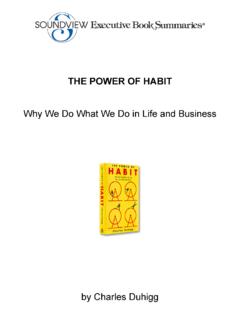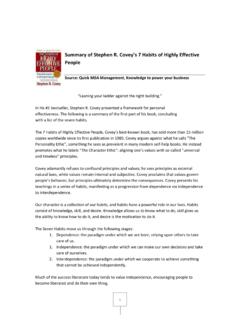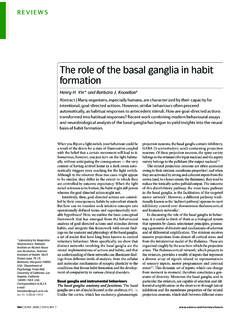Transcription of Summa Theologica Ia IIae q94. THE NATURAL LAW
1 1 Summa Theologica Ia iiae q94. THE NATURAL LAW 1. What is the NATURAL law? 2. What are the precepts of the NATURAL law? 3. Are all acts of virtue prescribed by the NATURAL law? 4. Is the NATURAL law the same in all? 5. Is it changeable? 6. Can it be abolished from the heart of man? [From the Summa Theologica of Saint Thomas Aquinas as translated by the Fathers of the English Dominican Province, and from the works of Blessed John Duns Scotus as selected and arranged by Jerome of Montefortino and as translated by Peter Simpson. Texts are taken from the Opus Oxoniense, the Reportata Parisiensia, and the Quodlibeta of the Wadding edition of Scotus works.] Article 1. Whether the NATURAL law is a habit? Aquinas Objection 1. It would seem that the NATURAL law is a habit. Because, as the Philosopher says (Ethic. ii, 5), there are three things in the soul: power , habit, and passion. But the NATURAL law is not one of the soul s powers: nor is it one of the passions; as we may see by going through them one by one.
2 Therefore the NATURAL law is a habit. Objection 2. Further, Basil [Damascene, De Fide Orth. iv, 22 says that the conscience or synderesis is the law of our mind ; which can only apply to the NATURAL law. But the synderesis is a habit, as was shown in the I, 79, 12. Therefore the NATURAL law is a habit. Objection 3. Further, the NATURAL law abides in man always, as will be shown further on (6). But man s reason, which the law regards, does not always think about the NATURAL law. Therefore the NATURAL law is not an act, but a habit. On the contrary, Augustine says (De Bono Conjug. xxi) that a habit is that whereby something is done when necessary. But Scotus [Loc. infra cit.] Objection 1. It seems that NATURAL law is a habit, for, from what was said above ( ), the NATURAL law embraces the first practical principles and the conclusions evidently deduced therefrom (as that the honorable is to be pursued and the dishonorable to be fled from, and so much so that it is necessary to live temperately and to beware of intemperance which are evident and necessary inferences from the principles).]
3 But there is a habit of principles instilled in us about things to be done which is called synderesis and which is never extinguished; therefore the NATURAL law needs to be established in some habit. Objection 2. In Ethics it is said there are three things in our soul, namely power , habit, and passion; but the NATURAL law is not any of the powers of the soul, nor any passion of it, as is clear; on the contrary, since of itself it regards the right and the honorable, it intends to exclude from the soul every passion; therefore it must be some habit. Objection 3. All vice and all malice are 2 such is not the NATURAL law: since it is in infants and in the damned who cannot act by it. Therefore the NATURAL law is not a habit. I answer that, A thing may be called a habit in two ways. First, properly and essentially: and thus the NATURAL law is not a habit. For it has been stated above (90, 1, ad 2) that the NATURAL law is something appointed by reason, just as a proposition is a work of reason.
4 Now that which a man does is not the same as that whereby he does it: for he makes a becoming speech by the habit of grammar. Since then a habit is that by which we act, a law cannot be a habit properly and essentially. Secondly, the term habit may be applied to that which we hold by a habit: thus faith may mean that which we hold by faith. And accordingly, since the precepts of the NATURAL law are sometimes considered by reason actually, while sometimes they are in the reason only habitually, in this way the NATURAL law may be called a habit. Thus, in speculative matters, the indemonstrable principles are not the habit itself whereby we hold those principles, but are the principles the habit of which we possess. Reply to Objection 1. The Philosopher proposes there to discover the genus of virtue; and since it is evident that virtue is a principle of action, he mentions only those things which are principles of human acts, viz. powers, habits and passions. But there are other things in the soul besides these three: there are acts; thus to will is in the one that wills; again, things known are in the knower; moreover its own NATURAL properties are in the soul, such as immortality and the like.
5 Reply to Objection 2. Synderesis is said to be the law of our mind, because it is a against nature, as was said above in [collected from Oxon. 2 ; ; ; ]; but they cannot be contrary to rational nature unless they are equally dissonant from the NATURAL law; since, therefore, nature is first act, NATURAL law cannot be set up as coincident with it in act but in habit. On the contrary, [Oxon. 1 ; 2 , ] We use a habit when we wish, Ethics ; but NATURAL law, when we do not want it to, murmurs against the evil things we have done, that is, it disapproves and rebukes what is done against its precept; therefore it is rather to be established as in act than in habit. I answer that, on the supposition that the idea of law pertains to the will, so much so that it belongs to the will alone, reason having preceded, to pass laws and to bind subjects to their observance, then, with this supposed, I say it is manifest that a NATURAL law, having the power of a law that restricts and binds, necessarily implies an act of the divine will, by which also nature is founded.
6 But rules about doable things passed by the divine will are preceded by a judgment of the divine intellect, which intellect since, by its simple intuition of all possibilities, has given to them their first intelligible and possible being, so it has passed judgment on their agreement and disagreement with each other, whether in theoretical or practical matters, because all principles, whether practical or theoretical, are taken from the ultimate end; and, further, by such judgment of the divine intellect the eternal law stands and is constituted, as we said in [see above on ]. But since [Oxon. 1 ; ] rational nature is a certain participation in the uncreated light, it too in its own way equally discerns in the terms it apprehends the immutable agreement and 3 habit containing the precepts of the NATURAL law, which are the first principles of human actions. Reply to Objection 3. This argument proves that the NATURAL law is held habitually; and this is granted.
7 To the argument advanced in the contrary sense we reply that sometimes a man is unable to make use of that which is in him habitually, on account of some impediment: thus, on account of sleep, a man is unable to use the habit of science. In like manner, through the deficiency of his age, a child cannot use the habit of understanding of principles, or the NATURAL law, which is in him habitually. _____ disagreement of the same the act of the divine intellect, which judges that that is how they are and should be judged by everyone, giving them their perpetuity and immutability. The intellect of God, indeed, is the measure of the whole of nature [Quodlib. ] so that nature cannot be in any other way than as it has received from the measure that gives it its first intelligible and possible existence; so the terms, being posited with such existence, are in either agreement or disagreement. In the way, therefore, that the judgment of the divine intellect, preceding the choice of the will, constitutes the eternal law as immutable and first measure of doable things (by which law judgment and discernment are made about the agreement and disagreement of all things, and judgment is made about what is required for the thing done to be said to be in agreement or disagreement with its own first measure); in that way the law, to the extent that it is understood to be derivative and to be instinct in the rational creature, can exactly indicate whether what happens is in agreement or disagreement with its nature, which is a participation in the uncreated light.
8 But in such an indicating or showing there does not appear to be any force of binding; for it is a certain necessary and immutable illumination in whose light is, indeed, beheld some idea of the honorable and dishonorable through a comparison with itself as it inclines always to that which is better and is more consonant with its perfection, yet it cannot, in the process, see itself to be obliged to follow such an instinct. Rules were, therefore, necessarily added by which this same nature might be bound to following the dictates of its own nature. Therefore the NATURAL law, or rather the law of nature, insofar as it is a certain judgment, in which the force of obligating does not shine forth, is not a habit but an act of reason judging that the agreement and disagreement of the terms with each other and with itself are as they are. But the NATURAL law which has completely and perfectly the nature of a binding law includes, in addition, an act of will commanding that we should perform whatever is judged and dictated by right reason; and that is the bearing of the divine mandates about love of God and neighbor [Oxon.]
9 Prolog. ] even though not all of them are principles, or conclusions evidently derived from the principles: nevertheless the divine positive law handed down in Sacred Scripture seems to be a certain explication of the NATURAL law which, according to the Apostle in Romans 2, is written in our hearts. And it is manifest that these obligatory explications and rules belong to an act of the divine will. Reply to Objection 1. I answer that the NATURAL law properly taken does in fact consist of the practical principles and of the conclusions evidently inferred therefrom; but none of these has the force of binding law unless an act of will be added to them commanding 4 that things be done as NATURAL reason dictates; NATURAL law is thus not to be placed in a habit but in an act of will, or in an act of reason, as it indicates precisely what is to done and avoided (cf. Ia ). But although synderesis is a habit of principles, it is not NATURAL law nor a law of rational nature.
10 But it passes judgment by the instinct of each of them and by the light of the intellect, should it be the case that it has done evil deeds against the inclination of its own nature and against the divine command, which binds it to act according to the light that is instinct in it and that has been further declared to it by revealed teaching. Reply to Objection 2. We say that since, over and above there being habit and passion in the soul, there is also act in it as proceeding from power , there is no necessity, because NATURAL law is not a power or a passion, to place it in a habit; for it is an act of intellect judging the agreement and disagreement with rational nature of doable things. But as it binds and restricts to keeping what right reason dictates, it includes an act or a command of the will. Reply to Objection 3. It is evident from what was said in why all vice is contrary to nature, because, of course, [Oxon. 2 ] it is against the affection for justice, whereby we are inclined to virtue and honorability (although it is in agreement with the affection for the advantageous, whereby we are quick and prompt to take delight in the sensitive appetite and in its concupiscible and irascible forces).









